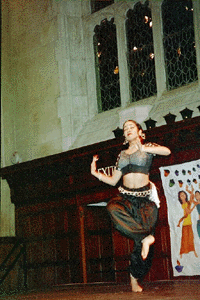I went to all the links---the academic conversation definitely sparked some
thoughts of my own, but I feel at a loss to express them. I think I've forgotten how to
articulate
complex thought! I'm definitely getting nervous about returning to school.
But I'm going to TRY to convey some of my reflections. I was only able to read
a
couple of the postings. In one of them, you wrote if an idea performs a
concrete
function, then it operates as truth, suggesting (what I believe to be true)
that there is
no ultimate reality, singular truth, and that in fact many times, attempts to
conclude
some sort of concrete reality lead to misunderstanding, violence, etc....
You also
wrote
that in decision making, choices are not made because doubt has been temporarily
abandoned, but rather that because we embrace the fact that we can act in spite
of our
doubts/confusion. OK I realize that I'm basically restating everything you
wrote. In an
attempt to NOT make this email a synopsis of your thoughts, I'm going to cut to
the
chase and just tell you I agreed with all you wrote in this posting and I was
struck
particularly by the parallel you drew with 9/11 at the end of the posting.
In
working
with Afghani refugee youth I have observed them trying to create new
realities/truths
for themselves not only as they learn to live bicultural identities, but also as
they try to
process all the violence and oppression they have lived with American
expectations
and standards of teenage "angst" and "coolness." They are simultaneously
playing
parental roles in the home (providing translation skills for their parents,
navigating
American culture and systems--this leads to all sorts of power issues between
the
parents and children) while occupying the bottom of the totem pole at school
socially
as well as academically (in ESL classes). These students travel in and out of
multiple
realities many times in the span of a single day. I suppose in some ways, we all
do. But
its obviously different for them.
In talking with some of them daily, I often
talked
about these ideas of claiming power in uncertainty, about how you can practice
power
in the gray areas, refusing to be limited by singular categories of identity,
and creating
your own sense of self. I talked about how these areas are far from safe, but
you can't
really find your own personal freedom and truth if you only want to feel safe.
These are
the ideas that influence my own life (I am reminded of Anzaldua's
Borderlands--when I
first read sections of that book as a college freshman, I truly found
connection--I
related with her thoughts).
But Anne, some of these students truly challenged me
on
this. If your experience has been nothing but instability (and again, I
realize that this
is true for all of us on some level but in their case, its quite an extreme), if
you have
never been able to claim even a false pretense of security whether by
identifying with a
nationality, or with family, or gender, or religion---if unsafety has always
been your
only reality, then the challenge for you is not really to push yourself into an
unstable
place to try to claim freedom or some sense of personal truth, maybe the
challenge is
to find some sort of concrete truth, even if its based on something entirely
superficial.
Only by experiencing a sense of "safety" even if its false and of course
temporary, can
you move forward to live your constantly evolving personal truths.
I've always
approached these issues from an entirely different perspective. Although I
constantly dealt with the instabilities of bicultural identity, at least I could
claim the
name and locations. I could say with security that I was an Indian American--my
family
lives in St. Louis Missouri, USA, and Bombay, Jaipur, and Pune
India....etc...granted as I
grew older, these labels had fluid definitions, as I learned to establish my own
personal
realities, but the fact that I began with something stable (even if it was only
superficially stable) is such a privilege. As a refugee, what is even
superficially stable
about your identity? Some of the students I worked with--many, in fact, were
born
refugees--their notions of home (they had no home, physical or otherwise),
culture
(their culture was in perpetual persecution), family (many were killed, those
remaining
were often emotionally unavailable, shells of their former selves), religion
(there was
the Islam they lived at home and the Islam the Taliban enforced--some rejected
God
altogether) never had any solid base. Mine did---even if I realized later that
these
bases were never solid, that they had always been in flux, it was a privilige for
me
initially to believe they were somewhat solid. It was a certain level of safety
that allowed
me to venture into uncharted territory and then challenge those notions.
Anyway, I don't even know if I'm making much sense--I hope I was able to somewhat
articulate my thoughts and add another perspective.
The only other thing I wanted to add was that in reading the posting about the
useless,
and false notion of mind-body dichotomy, Paul Grobstein suggested that one can get
rid of
this dichotomy by noting that the body is part of the nervous system and that the
nervous system is part of the body. But then it was also suggested that
unconscious parts of the body may do certain things not because consciously know them to be
right, but rather because they are less wrong (i.e. a tree branch that reaches
toward
the sunlight). I don't totally agree with this concept. Coming from my background
in
Indian classical dance, dance is a form of prayer--there isn't necessarily any
distinction
between the prayers made by the mind or the movements of the body. I believe that
the
body does have a certain consciousness and makes certain movements/ expressions
not because they are less wrong but because it retains its own consciousness of
right.
OK I'm going to stop rambling now. Thank you for sending me the link and
allowing me
to listen in on the conversation. I miss that kind of dialogue and I'm not sure
that my
graduate experience will fulfill that desire for me. It was hard for me to pick
public
policy because a large part of me was drawn to graduate programs that I guess
simply
put were more academic, theoretical, etc....but then another part of me was
afraid of
getting lost in academia and losing touch with the the driving force I've always
had to
work in the field of social justice. I know there are many academics who are
able to
balance theory and practice well....I hope to be able to do
this.
Springboard, mind you: not a fixed foundation (doesn't the body sometimes...miss a step in the dance?). Certain enough for claiming what one knows, for acting, for dancing--always knowing that it's re-enactable/re-danceable/re-doable.

